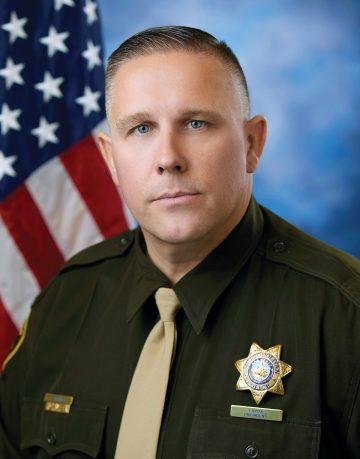
President
This article is going to talk about what I feel is the myth surrounding LVMPD being the best-trained police department in the country. While I do not feel our training is anywhere near where it should be, this does not mean we do not start out as one of the best-trained departments in the country. I believe that the instruction and training that our officers get in the Academy are second to none. We spend a long time learning and practically applying things that we are given over the course of six months.
When coming out of the Academy, officers have a great base for tactics, policy, search and seizure, and defensive and firearms tactics. The instructors who teach at the Academy do a great job and have so much good information to pass along. Many hours of these teachings are spent drilling them time and again during those six months. Multiple repetitions for any skill set are how that skill set becomes part of you. With such a heavy emphasis put on new officers at the Academy, one would think that that same emphasis is applied throughout an officer’s entire career. Sadly, we know this is not the case. I think after we leave the Academy, we lose those amazing skills we obtained in the Academy.
Getting on the streets and handling calls for service or impacting hotspot areas becomes more important than keeping your skill set in good working order. It would appear that our agency feels that if it was taught to you in the Academy, you would always have those skill sets. That is an amazingly horrible thought process. Look at any pro athlete in any sport. They do not train for six months, become very proficient at their craft and then just stop until the day comes for a game or match. If a fighter in the UFC developed their skills and no longer had a fight camp to train and prepare for their upcoming fight, they would stand no chance at victory.
The truth is skill sets need to be continually developed and practiced over thousands of hours of time. Repetition over repetition is the only way to maintain your training. Once our officers graduate from the Academy, the most training they get is in front of a computer screen through UMLV.
When we look at the officers who work in areas such as FTTU, AOST, RBT, MACTAC and others, they can pass along some great training to our officers. But we only go four times a year to the range to stay proficient in handling and using our firearm, which is the highest level of force we have. We do defensive tactics four times a year, but every quarter is different, so you only really skill-build a specific tactic one time a year.
We do RBT/AOST once a year to apply our thought processes and training in real-world-based scenarios. And then we spend countless hours on UMLV, getting nonsense classes and only very few good ones that challenge our retention of Department policy and case law.
Most of the classes are merely to satisfy some outside group that probably isn’t all that law enforcement friendly anyway. Training days with structured training fall by the wayside for DP units or pet projects in the community. But every time we skip training, we lose or diminish our skill set. When an officer is involved in a case that goes to a use of force/tactical review board, the CIRT team always brings up our officers’ training. However, they fail to recognize how little we actually train and blame officers for things they trained on five years ago in the Academy or read in UMLV.
Policy changes happen frequently but are rarely hammered home with kinesthetic training/hands-on training so that the new policy has been ingrained in the officer. I have observed the use-of-force policy change several times over my career, and the only training given is a new document and a sign-off sheet to acknowledge you got the policy change. And our agency and the public wonder why officers make mistakes!
We are not getting the proper amount of training to truthfully say that our officers are the best-trained police department in the country. We could be, though. It may mean one day, a few extra 416b calls hold because a squad is continuing to build their critical skill set rather than hitting the streets to clear up calls.
Of course, we all recognize that our agency is down bodies. But if we want the best response to a police call for service, we need to provide our citizens with the genuinely best-trained police officers that we can. That training doesn’t come from a computer screen. It comes from real training days, with real direction and real application. For now, I would advise you to seek out your own training. Whether it is coming to the PPA to train with Chad Lyman, going up to the range or getting together as a squad on your own time to train, you need to do something to increase the likelihood of you winning an engagement during your tour of duty. Stay safe and train.

